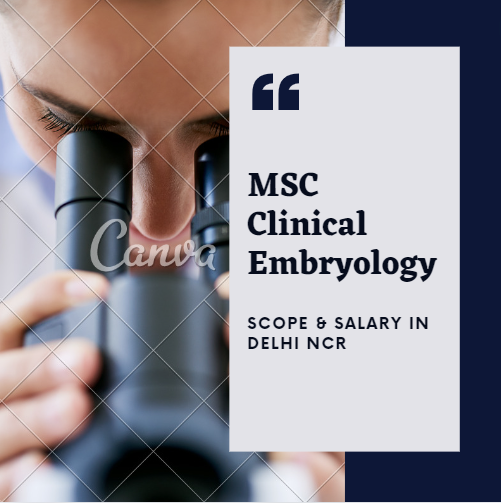Clinical Embryology is a rapidly growing field that deals with the study of fertilization and development of embryos. As the demand for assisted reproductive technology (ART) continues to rise, the scope of Clinical Embryology is expanding, offering numerous job opportunities for professionals in this field. In this blog, we will explore the scope and salary of MSC Clinical Embryology in Delhi NCR.
Scope of MSC Clinical Embryology in Delhi NCR
Delhi NCR is home to several top-ranked institutions offering MSC Clinical Embryology courses. The region’s proximity to major hospitals and research centers provides ample opportunities for students to gain hands-on experience and work with renowned experts in the field. The scope of Clinical Embryology in Delhi NCR includes:
- Assisted Reproductive Technology (ART) Labs: Delhi NCR is home to numerous ART labs, offering a wide range of services, including IVF, ICSI, and embryo freezing. Clinical Embryologists play a crucial role in these labs, ensuring the success of these procedures.
- Hospitals and Research Centers: Delhi NCR is home to several top-ranked hospitals and research centers, including AIIMS, KMC Manipal, and SRMCRI Chennai. These institutions offer opportunities for Clinical Embryologists to work alongside experienced professionals and contribute to groundbreaking research.
- Private Clinics and Fertility Centers: The demand for private clinics and fertility centers is increasing, offering opportunities for Clinical Embryologists to work in a private setting and provide personalized care to patients.
Salary of MSC Clinical Embryology in Delhi NCR
The salary of MSC Clinical Embryology graduates in Delhi NCR varies depending on factors such as experience, institution, and location. However, here are some approximate salary ranges:
- Entry-level salary: ₹2.5-4 lakhs per annum
- Mid-level salary: ₹4-6 lakhs per annum
- Senior-level salary: ₹6-8 lakhs per annum
- Lead/Manager-level salary: ₹8-12 lakhs per annum
Career Prospects
Clinical Embryologists can expect bright career prospects, with opportunities to work in various settings, including hospitals, research centers, and private clinics. With experience, they can move up the career ladder, taking on leadership roles or starting their clinics.
Here are the top 5 Collages for MSC Clinical Embryology in Delhi NCR
- The School of Embryology and Assisted Reproductive Technology (SEART) located in Gurgaon
- All India Institute of Medical Sciences (AIIMS) located in Delhi
- Amity University located in Noida
- International Institute of Reproduction and Fertility Training (IIRFT) located in Delhi
- I-Ceat - Clinical & Embryology Academy of ART located in Delhi
Conclusion
MSC Clinical Embryology is a lucrative career in Delhi NCR, offering a wide range of job opportunities and a competitive salary. With the demand for ART services increasing, the scope of Clinical Embryology is expected to grow, making it an attractive career choice for students and professionals alike.
FAQS:
Q: What is the average salary for an MSc Clinical Embryology graduate in Delhi NCR?
A: The average salary for an MSc Clinical Embryology graduate in Delhi NCR can range from ₹30,000 to ₹1.5 lakhs per month, depending on experience and the organization.
Q: What are the top recruiters for MSc Clinical Embryology graduates in Delhi NCR?
A: Some of the top recruiters for MSc Clinical Embryology graduates in Delhi NCR include hospitals, fertility clinics, and research institutions such as Galaxy Education, Apollo Hospitals, and Max Healthcare.
Q: What are the key skills required for an MSc Clinical Embryology graduate to be successful?
A: The key skills required for an MSc Clinical Embryology graduate to be successful include strong knowledge of embryology, excellent communication skills, attention to detail, and the ability to work in a fast-paced environment.
Q: What are the growth prospects for MSc Clinical Embryology graduates?
A: The growth prospects for MSc Clinical Embryology graduates are excellent, with the demand for skilled embryologists increasing due to the growing number of infertility cases in the region.





Comments